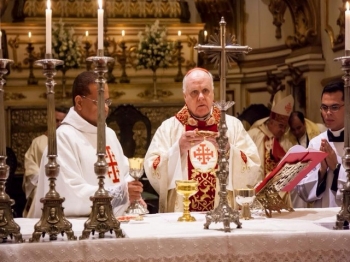“We want to develop the Order”
 Cardinal Edwin O'Brien celebrating Mass with the local Lieutenancy during his recent visit to South America
Cardinal Edwin O'Brien celebrating Mass with the local Lieutenancy during his recent visit to South America
Following the meetings of South American, North American and European Lieutenants, which took place in the past few weeks, Cardinal Edwin O’Brien, Grand Master of the Order of the Holy Sepulchre, reflects on the common elements he noticed emerging from the various Lieutenancies; most especially the value of exchanging local experiences from members of our Order around the world.
In June you were in Toronto where you took part in the meeting of North American Lieutenants who guide about half of the world members of the Order. A few days earlier you were in Bueons Aires to meet with the South American Lieutenants who represent a smaller component of our Order. How do you see the presence of the Order in that region of the world?
The experiences that Lieutenancies live are varied and we hope, in time, to have a Vice Governor General for South America because there are cultural differences, not only between North and South America but also within the same region. We want to develop the Order more fully there and our recent visit was very helpful in planning that development. There is interest on the part of some bishops (in South America) to have the Order present there and we have to discern how we are going to proceed.
After having concluded a third regional meeting, the one of the European Lieutenants here in Rome, do you see some points in common regarding the feedback you received from Lieutenants in these three regions of the world?
Concerns have been expressed regarding membership and formation of members, not only as they are planning to enter the Order but ongoing formation. We have great expectations about clergy, we do have Knights chaplains and we are still not making the most of their presence. We also have great expertise among members, we are emphasising Lieutenants and their ledership but our Lieutenants should also work to bring forward that leadership among members.
When the mandate of a Lieutenant is coming to an end is not always easy to find a replacement for him/her. This tells us that maybe in our Lieutenancies we have to learn how to develop, encourage and discover leadership that is already there. Sometimes we find Lieutenants who want to stay on, understandably, for another mandate and he/she has done a beautiful job - but this is not a sufficient reason to stay on. Every office should be rotated. There are definitely other people in the Lieutenancy who may contribute with their expertise and Christian commitment.
You are also planning to visit the Australian Lieutenancy in September…
Our visit will possibly encourage a greater attendance to the Consulta, the Order’s five-year general assembly which will take place in Rome in November. To go to Australia is a great stretch and for the Australians to come to the Consulta is the same. There can be obstacles but I think that the more we get around to travel, the more we suggest that distances should not be obstacles.
We talked about the common points joining the Lieutenancies around the world. Have you also learned during these meetings about specific local experiences which may inspire the whole of the Order?
This is exactly what the meetings of Lieutenants are for. During these gatherings many Lieutenants take notes and the reason why we come together is to exchange ideas. This is not something we can plan but these meetings are intended to bring out what otherwise would not be known by the rest of the members and to encourage some new approaches and ongoing communication. It is also an important time for people to meet, socialize, pray together, and talk about the Order’s businesses.
The Order is increasingly reflecting on the presence of young members in its Lieutenancies. What message do you want to send about it?
I think this is a challenge the Universal Church is facing everywhere. Individualism pervades Western culture: this affects any organisation and we have to take note of that and to appeal to what is common to individuals such as companionship, social involvement, desire for knowledge, insights into problems and situations of the world. We have to listen and to get to know young people before we act and continue to build the Order thanks to their presence. To enrich the Order by one’s own involvement and attract new and young members is not only the role of the Lieutenants but of all Knights and Dames in the Lieutenancy.
Interview by Elena Dini
(July 2018)



